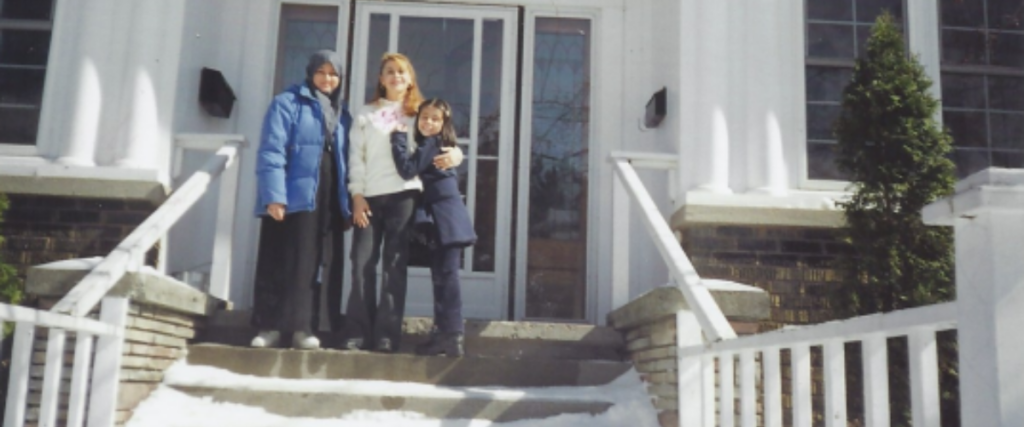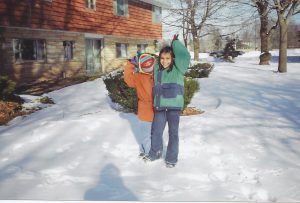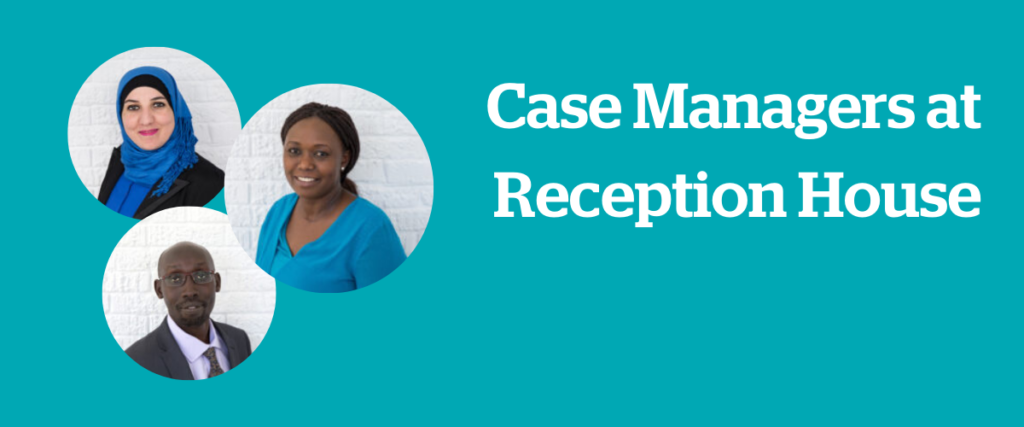Farotan Noorullah (Client and Volunteer)
Farotan is a client and a volunteer for Reception House. He supported meal services at the temporary accommodation and this is what he has to say:
“As you know I had arranged a list including names of all families who had settled in the hotel. They had standard regular in line to receive safe and equal food (breakfast, lunch & dinner). This situation was pleasant for me and all families and Reception house staff.”

(Farotan Noorullah with his daughter at Circle of Connection Event, 2023)
Yi Xu, Aka Anna (Student Placement and Volunteer)
Anna came in as a student placement from University of Waterloo and wanted to continue volunteering even after her placement ended.
“One of the most heartwarming moments I’ve cherished while volunteering at Reception House involves the children I work with. Their genuine kindness always comes through, even in situations where language is difficult. One summer activity session, while I was rushing about trying to get everything organized, a small girl softly tugged at my hand. She smiled and led me to a chair, urging me to take a rest. It was such a small, yet incredibly meaningful act of kindness and consideration that really warmed my heart. Words weren’t needed at that precise time to convey the warmth and connection we had. It served as an inspiration that kindness is universal and that the highest kinds of human connection can frequently be discovered in the smallest deeds of kindness. I will always cherish this encounter as a lovely reminder of the value of interpersonal relationships and the happiness that comes from looking out for one another.”

(Left: Yi Xu, Anna during Multicultural Festival, 2023)
Farahnaz Formuli (Client Volunteer)
Farahnaz was reception house client in 2022. Farahnaz was volunteering while they were in the temporary accommodation with sorting donations and arranging them.
She came back again this year wanting to volunteer and support RH in whatever capacity.
“Since I didn’t know the language before, I needed help but now I am your colleague and on the contrary, I can help people wo used to need cooperation like me. I am happy and I feel good. Last week when I was working with a number of families to meet with the doctor, one of the mothers of these families was very happy and prayed for me. Seeing the smiles and happiness of these families is one of the unforgettable days for me while working with Reception House. I hope for more cooperation with you and I am proud to be a good colleague for Reception House. The reason for choosing to work with you is my previous experience in Turkey doing similar work and also the experience of a new immigrant in Canada since 2022.”

Sibomana Tafsiri (Past Volunteer for Children’s Program)
“At the reception House, the most memorable moment that I experienced that impacted my life, is the connections I made with employees, I met people, I learned, I developed a social skills and interpersonal growth that I will carry in my career and my personal life.”
Anne Obozua (English Conversation Circle Volunteer)
“To commemorate the National Volunteer Week, I find myself reflecting on a memorable experience from my time volunteering for the Conversation Circle at The Reception House in Kitchener. It was in March of 2024, and the air held a hint of spring’s arrival. Stepping into the familiar warmth of the reception hall, I felt anticipation for the morning activities. Each week, this space became a sanctuary for newcomers, offering them a supportive setting to refine their English skills and build connections within their new community.
In this session, I witnessed a remarkable transformation in the majority of these participants. With newfound confidence, they navigated the dialogue with ease, articulating their sentences and communicating with confidence.
Observing this individual’s progress serves as a poignant reminder of the impact of perseverance and community support. Their journey underscores the transformative potential inherent in acts of volunteering, reaffirming my dedication to making a positive difference in the lives of others through meaningful engagement. In that moment, amidst the warmth and camaraderie of the reception hall, I felt a renewed sense of purpose in my role, committed to facilitating opportunities for growth and connection for those embarking on new beginnings.”

Arlene White (English Conversation Circle/Family Partnership Program Volunteer)
“I have only been a volunteer with Reception House for a few weeks and within that short timeframe I’ve been introduced to the wonderful staff, volunteers and newcomers we serve through the twice weekly English Conversation Circles at their entry point of residence to our community.
This experience has been an amazing and humbling learning experience on many levels – from the skills, talents and compassionate service delivered by the staff and other volunteers, to the close relationships I’ve already built with one family who I’m now working with to continue to help with their English language skills and community familiarization needs.
For me, it has proven that I don’t need to have any fancy skills, but just need to be present, authentic, caring and involved to help newcomers feel welcome, heard, seen and appreciated and to give them the respect, assistance and information needed to assume their new lives in our community. It is an honor and pleasure to be part of this important service and as a relative new resident of the area myself, I’m grateful for the new friends and colleagues I’m making and the community education this is providing to me. The ripple effect of the benefits of these services to everyone involved cannot be overstated. Thank you for allowing me to be part of this!”

*(Picture: Volunteer Arlene for English Conversation Circle at the temporary accommodation)





